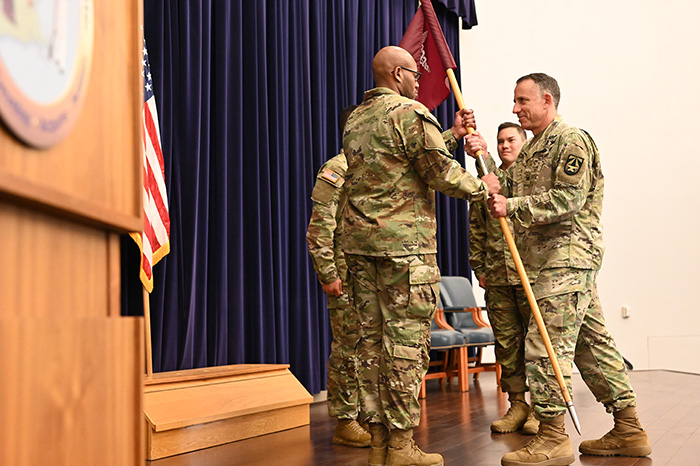USARIEM Welcomes New Headquarters and Headquarters Detachment Commander

In a change of command ceremony June 27, the U.S. Army Research Institute of Environmental Medicine (USARIEM) welcomed Capt. Aaron J. Judson as the new Headquarters and Headquarters Detachment (HHD) Commander. Col. Michael Cohen, USARIEM Commander, officiated the ceremony, passing the ceremonial colors from outgoing HHD Commander, Capt. William H. Neumeier, to the HHD Commander, Judson. Family, friends, colleagues and distinguished guests witnessed the ceremony.
"HHD has a critical role in our organization—they provide the administrative support and training to ensure the readiness of the Service Members assigned to USARIEM," said Cohen. "This is really important because readiness is part of the Army People First priority, but this is not an easy task on this unique installation that does not have the training areas and resources found on most traditional bases and installations."
Cohen explains that to accomplish this mission requires intelligent, creative and out-of-the-box thinkers and problem solvers.
"This is Capt. Neumeier. Under his leadership, HHD exceeded the standard of delivering readiness of his Soldiers," continued Cohen. "He succeeded by overcoming limited resources, limited time, and limited training areas. Under his leadership, this organization accomplished some remarkable things that not only built readiness but also improved the cohesiveness of the organization and supported our families."
Of his time as USARIEM's HHD Commander, Neumeier had nothing but thanks and praise for his fellow Soldiers and the USARIEM team.
"USARIEM, it is clear that you are winners," said Neumeier. "MRDC Best Medic, MRDC Non-Commissioned Officer (NCO) of the Year, Army Futures Command NCO of the Year, Major General Harry Greene Award, numerous products developed and papers published, one of the largest and swiftest Army policy changes with the body composition study, and just because you're so good you even did it for the Marines too. Research on mountains totaling over 26,000 feet of altitude. Projects conducted on multiple continents. And you all are such winners that some of you even go to Antarctica...for vacation."
Neumeier will report to the U.S. Army Aeromedical Research Lab at Fort Novosel, Alabama, as the Executive Officer.
To Judson, he said, "I know you are the right person to grow the support and care these people have for one another."
With a final "Blacksmith 6, signing off," Neumeier relinquished command to Judson.
Judson, a Veterinary Corps Officer, comes to USARIEM from Fort Johnson, where he served as the Chief of the Louisiana Branch of Veterinary Services.
Cohen welcomed Judson, saying, "In his time here so far, I can already tell that he has the energy, demeanor, and attitude that will make him successful in this position. He is committed to fitness and training, which will serve him well in the new position. Capt. Judson, I look forward to seeing you lead and grow in your new role."
Judson stepped up to the podium, thanking Col. Cohen, "for this opportunity to continue my growth and development as a leader. I am grateful for the honor and privilege of serving as a commander."
He continued by thanking Cpt. Neumeier for his guidance and assistance over the past few months, ensuring a smooth transition in leadership. Judson offered Neumeier and his family well wishes as they begin the next phase of their Army adventure.
In closing, Judson said, "I look forward to working with and serving all of you in my time here at USARIEM. Blacksmith 6, Signing In."
USARIEM is a subordinate command of the U.S. Army Medical Research and Development Command under the Army Futures Command. USARIEM is internationally recognized as the DOD's premier laboratory for Warfighter health and performance research and focuses on environmental medicine, physiology, physical and cognitive performance, and nutrition research. Located at the Natick Soldier Systems Center in Natick, Massachusetts, USARIEM's mission is to optimize Warfighter health and performance through biomedical research.
 An official website of the United States government
An official website of the United States government
 ) or https:// means you've safely connected to the .mil website. Share sensitive information only on official, secure websites.
) or https:// means you've safely connected to the .mil website. Share sensitive information only on official, secure websites.













